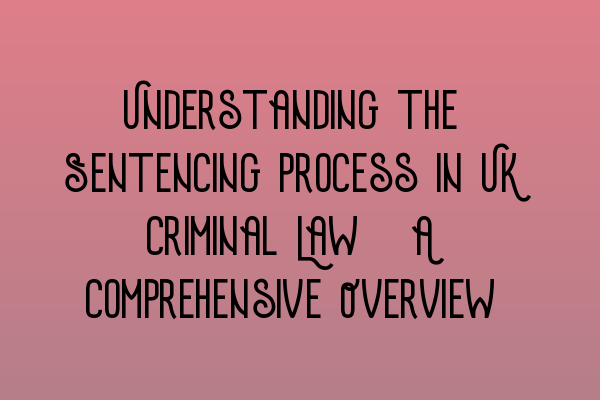Understanding the Sentencing Process in UK Criminal Law: A Comprehensive Overview
In the UK, the sentencing process plays a crucial role in the criminal justice system. It is this process that determines the punishment an offender will face after being convicted of a crime. As a solicitor at SQE Criminal Law & Practice Law UK, it is essential to have a thorough understanding of the sentencing process to effectively represent and advise clients. In this comprehensive overview, we will delve into the various aspects of the sentencing process, including its importance, the factors considered, and the different types of sentences imposed.
Before we delve into the intricacies of the sentencing process, it’s important to note the relevance of understanding it. In the legal profession, being well-versed in the sentencing process allows solicitors to provide accurate advice to their clients. It enables us to assess the potential consequences of a criminal offense and craft a suitable defense strategy. So, let’s explore the key elements of the sentencing process.
1. Sentencing Guidelines:
The sentencing process in the UK is based on a set of guidelines issued by the Sentencing Council. These guidelines provide a framework for judges and magistrates to determine the appropriate sentence for a specific offense. The guidelines consider various factors such as the seriousness of the offense, the offender’s culpability, and any aggravating or mitigating factors present.
2. Factors Considered:
When determining a sentence, the court evaluates several factors, including:
– Severity of the Offense: The gravity of the crime committed is a crucial consideration. More serious offenses typically warrant higher sentences.
– Offender’s Criminal Record: The court takes into account the offender’s previous criminal record, including any prior convictions. Repeat offenders may receive harsher sentences.
– Victim Impact: The court considers the impact of the offense on the victim, both physically and emotionally. This factor can influence the severity of the sentence.
– Aggravating and Mitigating Factors: Circumstances surrounding the offense, such as premeditation, the use of violence, or the presence of remorse, can either aggravate or mitigate the sentence.
3. Types of Sentences:
The sentencing process in the UK encompasses a wide range of possible sentences, including:
– Custodial Sentences: These involve imprisonment for a specified period, depending on the severity of the offense.
– Community Orders: Instead of prison, the court may impose community orders, which require the offender to undertake specific activities such as unpaid work or attend rehabilitation programs.
– Suspended Sentences: In some cases, the court may suspend a custodial sentence, allowing the offender to remain in the community under certain conditions. If the conditions are breached, the sentence may be activated.
– Fines: Monetary penalties may be imposed as part of the sentence. The amount is determined based on the offender’s means and the severity of the offense.
– Discharges: Certain minor offenses may result in an absolute or conditional discharge, where the offender is not further punished if they stay out of trouble for a specified period.
4. Sentencing Process: The typical sentencing process involves several stages, including:
– Offender’s Plea: The court takes into consideration whether the offender pleads guilty or not guilty. Early guilty pleas may result in reduced sentences.
– Pre-Sentence Reports: The court may request pre-sentence reports to gather information about the offender’s personal circumstances and the likelihood of reoffending.
– Allocation of Sentence: Based on the factors discussed above, the court determines the appropriate sentence and delivers its decision.
As solicitors at SQE Criminal Law & Practice Law UK, we understand the intricacies of the sentencing process and are equipped to guide our clients through this challenging phase. Our expertise in this area allows us to strive for the best possible outcome for our clients, whether in negotiating reduced sentences, exploring alternative sentencing options, or providing advice on appeals.
To enhance our clients’ understanding of the entire legal process, we offer comprehensive SQE 1 and SQE 2 preparation courses, ensuring that individuals aspiring to become solicitors are well-prepared for their examinations. For those seeking guidance in SQE exam practice, we also offer valuable resources such as SQE 1 Practice Exam Questions and SQE 1 Practice Mocks FLK1 FLK2.
In conclusion, understanding the sentencing process in UK criminal law is pivotal for solicitors practicing criminal law. It allows us to navigate through the complexities of the court system, advocate effectively for our clients, and help them achieve the best possible outcome. With SQE Criminal Law & Practice Law UK, you can rest assured that our expertise and commitment to excellence will provide you with the highest level of legal representation.
To learn more about our services and stay informed about upcoming SRA SQE exam dates, visit our website.
Related Articles:
– SQE 1 Practice Exam Questions
– SQE 1 Practice Mocks FLK1 FLK2
– SQE 2 Preparation Courses
– SQE 1 Preparation Courses
– SRA SQE Exam Dates
